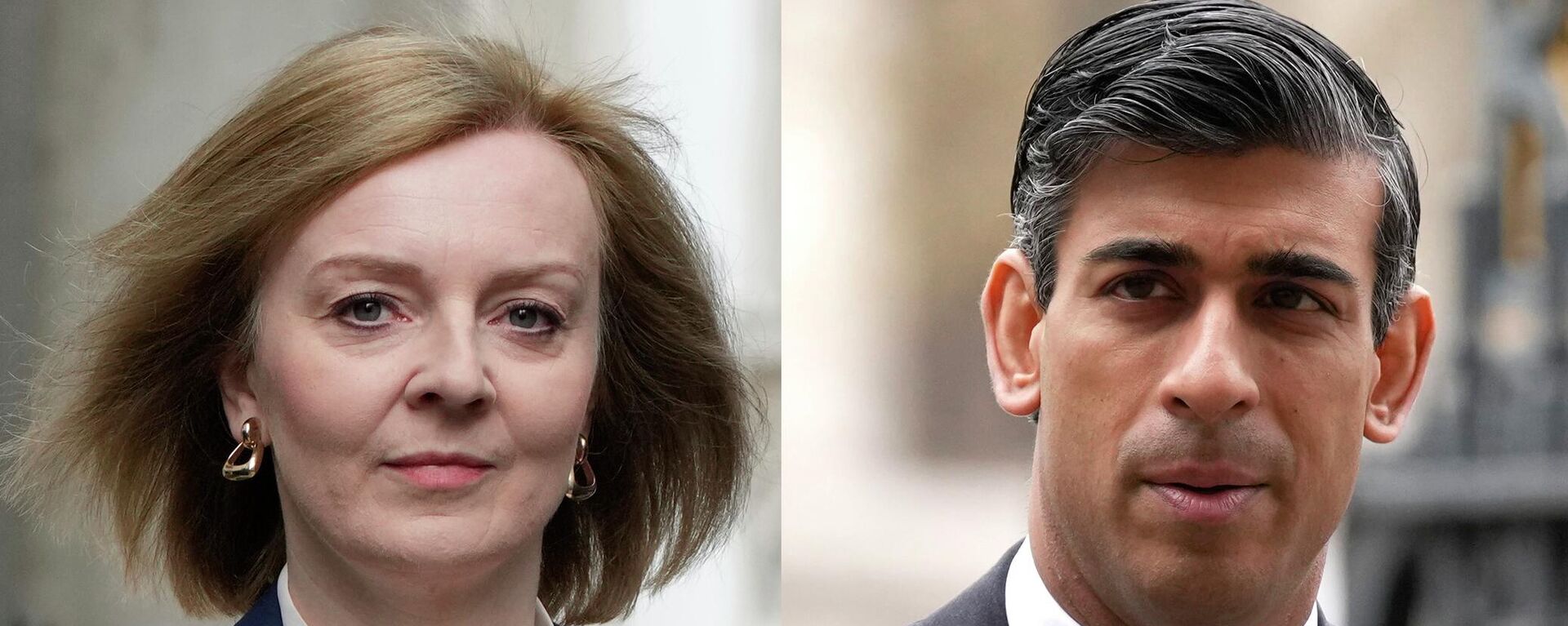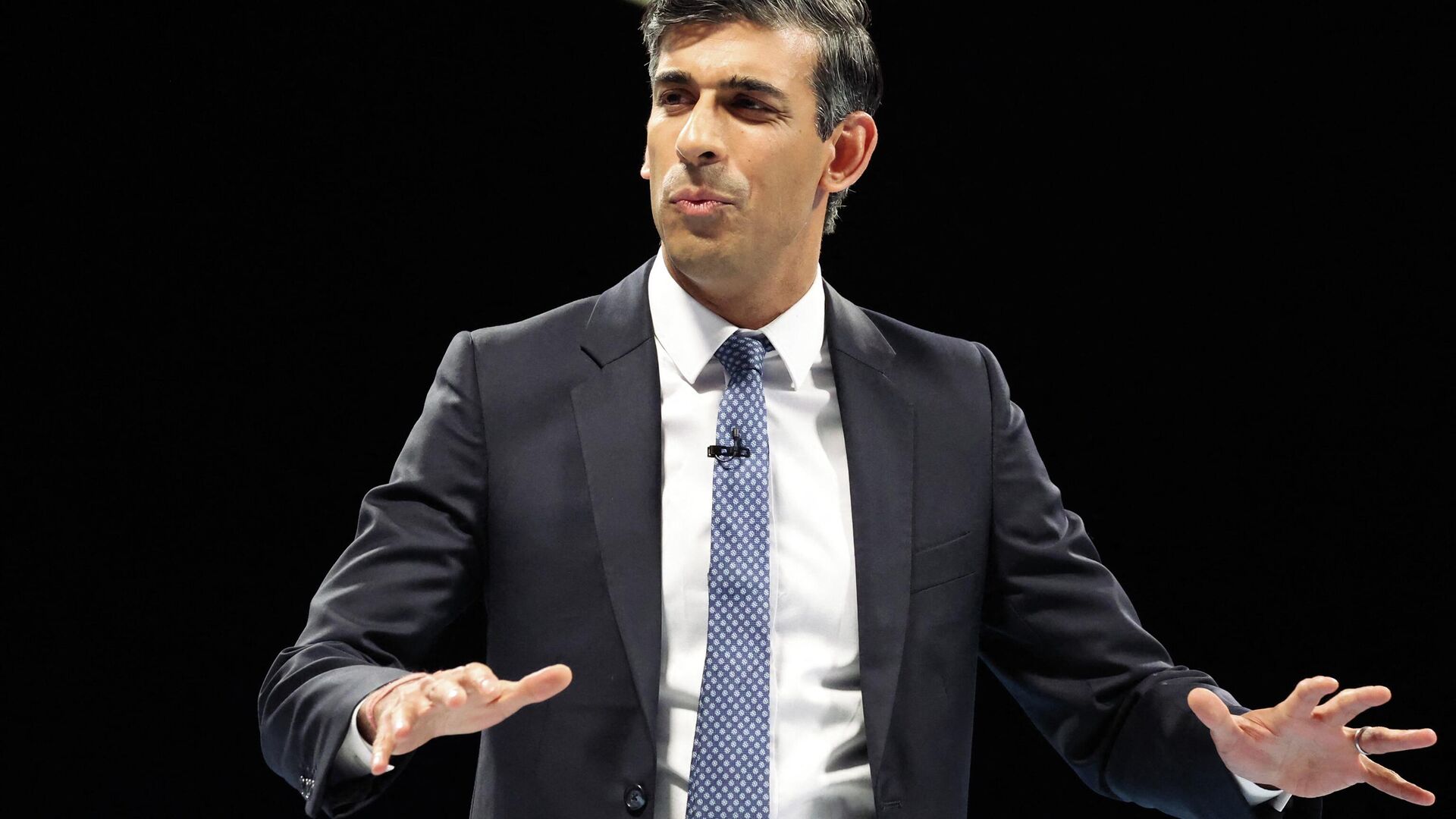https://sputnikglobe.com/20220904/more-of-bojos-russia-policy--thatcherite-economic-plans-where-would-sunak-lead-the-uk-as-pm-1100131262.html
More of BoJo's Russia Policy & 'Thatcherite' Economic Plans: Where Would Sunak Lead the UK as PM?
More of BoJo's Russia Policy & 'Thatcherite' Economic Plans: Where Would Sunak Lead the UK as PM?
Sputnik International
Rishi Sunak's campaign to be elected leader of the Conservative Party and British PM has been hobbled by his image as a tax-and-spend chancellor of the... 04.09.2022, Sputnik International
2022-09-04T06:37+0000
2022-09-04T06:37+0000
2023-05-28T15:20+0000
tory leadership race 2022
rishi sunak
liz truss
boris johnson
britain
great britain
united kingdom (uk)
https://cdn1.img.sputnikglobe.com/img/07e6/08/0c/1099500704_0:160:3073:1888_1920x0_80_0_0_263eaba023c080927c8d34c0c0e95150.jpg
Tory leadership contender Rishi Sunak could dial down the sabre-rattling towards Moscow as a way out of the energy crisis according to one British academic.The former chancellor of the exchequer is trailing hawkish Foreign Secretary Liz Truss in opinion polls of Conservative Party members ahead of the September 5 announcement of the next party leader and prime minister.But the race is not run yet, and grassroots Tories have the option of changing their vote online if they feel "buyer's remorse" after sending in their postal ballot.So what would a Sunak-led government look like?Dialing Down the RhetoricMark Garnett, a professor of politics at Lancaster University, said that if Sunak succeeds his old boss Johnson in Downing Street, "he is likely to follow a pragmatic line in foreign policy." Britain's embargo on Russian energy imports in retaliation for Moscow's special military operation in Ukraine has fueled inflation unseen since the 1970s, already above 10 percent and predicted to become almost double that. The resulting cost-of-living crisis has sparked strikes across numerous industries and professions, and was a factor in PM Boris Johnson's resignation in July.Unlike Truss, Sunak campaigned for the Leave vote in the 2016 European Union (EU) membership referendum.But in the academic's opinion, Sunak would also take a "softer line of rhetoric" towards the EU, most of whose member states are also Britain's NATO allies."He would probably work quietly to improve relations with the US, avoiding points of contention (like Northern Ireland) unless forced to take a provocative position," Garnett said.Tax and SpendThe professor also pointed out that while Sunak, like most Tories, was ideologically wedded to low taxation, he accepted the need to raise the national insurance and corporate tax to pay for the costs of the COVID-19 lockdown. Sunak has attacked Truss over her plans to reverse his increase in corporate taxes from 19 percent to 25 percent — set to come into force next April — along with other mooted tax cuts adding up to some £30 billion as her solution to the energy crisis that could tip millions of households into fuel poverty this winter.Sunak raised the corporate tax, along with national insurance, the British social security tax, to help repay some £400 billion in debt run up during the COVID-19 pandemic and to help the National Health Service (NHS) clear the resulting backlog of non-urgent cases. He has said that if he is elected leader, he will only lower those taxes again "once we’ve gripped inflation."But this year he also announced billions worth of assistance to households to help pay energy bills — to be paid for out of their own future taxes and by a "windfall tax" on oil and gas producers who continue to make unprecedented profits as global market prices soar.Sunak has promised to cut the basic rate of income tax, currently levied at 20 percent on earnings between £12,570 and £50,270, by one percentage point in 2023 and another three points by the next election.While the electorate as a whole might accept that argument, most of the Conservative Party members who will choose the next PM are hostile to tax-and-spend policies.He said inflation is likely to remain an issue until the next general election, which must be held by January 28, 2025."His main hope is that by that time the rate of increase in inflation might have slowed down, providing the kind of headlines which can convince some British voters that the problem is under control," the academic said."However, in the meantime Britons will have suffered falling living standards, and as a rich man Sunak would find it difficult to convince voters that the situation was affecting his own lifestyle."Back to Big Government?Alistair Jones, an associate professor of politics at Leicester's De Montfort University, said there were still many "one-nation" Conservatives who remember the pre-Margaret Thatcher era. They believe that "small state, low tax, low spend is not Conservative values," and that "the state has got an obligation to help the least well-off in society.""For many traditional Conservatives, those are actually Conservative values, not the neoliberal values that Thatcher espoused, that Sunak and Truss want to take even further," Jones said.The professor recognized that Sunak had gained a reputation as a "high tax chancellor."Sunak's strategy harks back to the austerity of the 1970s and 80s, the academic said, relying on persuading trade unions to accept below-inflation pay rises, cutting public spending, and relying on the free market to right the economy.In what may be a bid to limit public spending and stop rising wages adding to inflation, Sunak has said public-sector pay settlements should be decided by independent pay review bodies.But Jones stressed that economies have changed "markedly" since the 1970s, arguing that "it may well be that that perspective presented by Sunak is actually inaccurate and short term spending to stabilize the economy to enable people to actually make ends meet may actually be a good thing".
https://sputnikglobe.com/20220822/truss-under-pressure-as-sunak-camp-says-tax-cuts-will-put-people-on-the-street-1099844942.html
britain
great britain
united kingdom (uk)
Sputnik International
feedback@sputniknews.com
+74956456601
MIA „Rossiya Segodnya“
2022
James Tweedie
https://cdn1.img.sputnikglobe.com/img/07e4/08/1c/1080307270_0:3:397:400_100x100_80_0_0_7777393b9b18802f2e3c5eaa9cbcc612.png
James Tweedie
https://cdn1.img.sputnikglobe.com/img/07e4/08/1c/1080307270_0:3:397:400_100x100_80_0_0_7777393b9b18802f2e3c5eaa9cbcc612.png
News
en_EN
Sputnik International
feedback@sputniknews.com
+74956456601
MIA „Rossiya Segodnya“
Sputnik International
feedback@sputniknews.com
+74956456601
MIA „Rossiya Segodnya“
James Tweedie
https://cdn1.img.sputnikglobe.com/img/07e4/08/1c/1080307270_0:3:397:400_100x100_80_0_0_7777393b9b18802f2e3c5eaa9cbcc612.png
rishi sunak, liz truss, boris johnson, britain, great britain, united kingdom (uk)
rishi sunak, liz truss, boris johnson, britain, great britain, united kingdom (uk)
More of BoJo's Russia Policy & 'Thatcherite' Economic Plans: Where Would Sunak Lead the UK as PM?
06:37 GMT 04.09.2022 (Updated: 15:20 GMT 28.05.2023) Exclusive
Rishi Sunak's campaign to be elected leader of the Conservative Party and British PM has been hobbled by his image as a tax-and-spend chancellor of the exchequer during the COVID-19 pandemic. But pundits argue that his pragmatism appeals to the wider electorate.
Tory leadership contender Rishi Sunak could dial down the sabre-rattling towards Moscow as a way out of the energy crisis according to one British academic.
The former chancellor of the exchequer is trailing hawkish Foreign Secretary
Liz Truss in opinion polls of Conservative Party members ahead of the September 5 announcement of the next party leader and prime minister.
But the race is not run yet, and grassroots Tories have the option of changing their vote online if they feel "buyer's remorse" after sending in their postal ballot.
So what would a Sunak-led government look like?
Dialing Down the Rhetoric
Mark Garnett, a professor of politics at Lancaster University, said that if Sunak succeeds his old boss Johnson in Downing Street, "he is likely to follow a pragmatic line in foreign policy."
Britain's embargo on Russian energy imports in retaliation for Moscow's special military operation in Ukraine has fueled inflation unseen since the 1970s, already
above 10 percent and predicted to become
almost double that.
The resulting cost-of-living crisis has sparked strikes across numerous industries and professions, and was a factor in PM Boris Johnson's resignation in July.
"His policy towards Russia will probably be a continuation of Johnson's," Garnett stressed, "but the rhetoric will be less hostile — and he would be more likely than Truss to choose a moderate foreign secretary."
Unlike Truss, Sunak campaigned for the Leave vote in the 2016 European Union (EU) membership referendum.
But in the academic's opinion, Sunak would also take a "softer line of rhetoric" towards the EU, most of whose member states are also Britain's NATO allies.
"He would probably work quietly to improve relations with the US, avoiding points of contention (like
Northern Ireland) unless forced to take a provocative position," Garnett said.
The professor also pointed out that while Sunak, like most Tories, was ideologically wedded to low taxation, he accepted the need to raise the national insurance and corporate tax to pay for the costs of the COVID-19 lockdown.
Sunak has attacked Truss over her plans to reverse his increase in corporate taxes from 19 percent to 25 percent — set to come into force next April — along with other mooted tax cuts adding up to some £30 billion as her solution to the energy crisis that could tip millions of households into fuel poverty this winter.
Sunak raised the corporate tax, along with national insurance, the British social security tax, to help repay some £400 billion in debt run up during the COVID-19 pandemic and to help the National Health Service (NHS) clear the resulting backlog of non-urgent cases. He has said that if he is elected leader, he will only lower those taxes again "once we’ve gripped inflation."
But this year he also announced billions worth of assistance to households to help pay energy bills — to be paid for out of their own future taxes and by a "windfall tax" on oil and gas producers who continue to make unprecedented profits as global market prices soar.
Sunak has promised to cut the basic rate of income tax, currently levied at 20 percent on earnings between £12,570 and £50,270, by one percentage point in 2023 and another three points by the next election.
While the electorate as a whole might accept that argument, most of the Conservative Party members who will choose the next PM are hostile to tax-and-spend policies.
"Sunak showed during the pandemic that (unlike Truss) he is a problem-solver rather than an ideologue," Garnett stressed, but pointed out that if he won, the former chancellor would face the gloomiest economic outlook since 1945.
He said inflation is likely to remain an issue until the next general election, which must be held by January 28, 2025.
"His main hope is that by that time the rate of increase in inflation might have slowed down, providing the kind of headlines which can convince some British voters that the problem is under control," the academic said.
"However, in the meantime Britons will have suffered falling living standards, and as a rich man Sunak would find it difficult to convince voters that the situation was affecting his own lifestyle."

22 August 2022, 13:59 GMT
Alistair Jones, an associate professor of politics at Leicester's De Montfort University, said there were still many "one-nation" Conservatives who remember the pre-Margaret Thatcher era. They believe that "small state, low tax, low spend is not Conservative values," and that "the state has got an obligation to help the least well-off in society."
"For many traditional Conservatives, those are actually Conservative values, not the neoliberal values that Thatcher espoused, that Sunak and Truss want to take even further," Jones said.
The professor recognized that Sunak had gained a reputation as a "high tax chancellor."
"But Sunak argues that this is a temporary aberration, that it is a needs-must situation and it is only a short term thing," Jones said. "He has already promised that there will be tax cuts immediately after the next general election."
Sunak's strategy harks back to the austerity of the 1970s and 80s, the academic said, relying on persuading trade unions to accept below-inflation pay rises, cutting public spending, and relying on the free market to right the economy.
In what may be a bid to limit public spending and stop rising wages adding to inflation, Sunak has said public-sector pay settlements should be decided by independent pay review bodies.
But Jones stressed that economies have changed "markedly" since the 1970s, arguing that "it may well be that that perspective presented by Sunak is actually inaccurate and short term spending to stabilize the economy to enable people to actually make ends meet may actually be a good thing".




